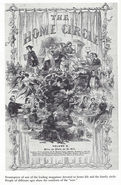Dwelling space has been, and probably will continue to be, a highly contested space.
The economic, the political, and the social coalesce around it, and the tensions between these three forces have been shaping the material construct of our homes throughout history.
The current domestic landscape is characterized by an increasing gap between, on the one hand, the rise of major demographic shifts in most industrialized countries - that results in the production of new forms of cohabiting, and on the other hand, the reassuring and often celebrated clichés of traditional family life - an ideological blanket that hides the structural changes that society undergoes. This means that, while the housing market all too often continues to replicate old stereotypical mono-functional urban developments of the post-war era, more and more people are actually living in very different circumstances, and “exceptions” have become the norm.
The current housing crisis thus is not only a crisis of scarcity and affordability, but also has to do with the lack of collective subjectification models and enabling spatialization strategies (polyvalence and empowerment): domestic living is both ideologically supported and de facto challenged by the current economy, a paradox that leads us to perceive as already obsolete most of the contemporary spatial configurations that prescribe our life in common.
So, if given the actual strain of resources and land, and the dissociation between provided living space and current socio-economic conditions, houses as we know them today will no longer be economically or ecologically viable, what should take the place of these inherited dwelling structures that dictate and confine? And how alternative urban living environments will look like in order to enable and support?
This Seminar is based on the premise that this crisis is a unique call for a radical reinvention of the idea of housing and explores the current renaissance of collaborative forms of living and the architectures that emerge from them as a possible answer for those questions.
Since the advent of industrialization, collective living has come to reference a distinctively different and unique way of life considered unconventional for many. This marginal condition allowed these experiences to play a significant role in the overall history of housing by providing the opportunity for reflection: over the last 150 years, collective living models have been witnesses to their era, revealing a great deal about how each epoch perceived lifestyles, lived together, operated their households, understood property and ownership, and excluded or integrated productive/reproductive labor into their cohabitation spaces. In doing so, they became critical antidotes to the fundamental logic of our capitalistic society, challenging existing gender, biopolitical and territorial hierarchies.
This elective will look closely at those historical models that often included a critique of the prevailing conservative ideas of living and housing, and revealed social processes through spatial expressions. From the French social utopias of the 19th century and the Garden Cities of early modernism, to hippy communes and squatter movements of more recent decades, the aim is to reveal how these previous experiences inform contemporary cooperatives, autonomous housing projects and architectures of sharing that are emerging across the world as an important part of a seismic shift towards a socially responsible architecture that seeks to respond to the key social challenges of our time.
The course will be a combination of lectures, reading discussions, project presentations and reviews, and will culminate in a proactive investigation into housing alternatives and urban futures conducted from a tangible perspective, evaluating the role of architects in the redefinition of a new form of life together, and the importance of the architectural expression in giving consistency to the political claims of ways of living otherwise.






















































































































